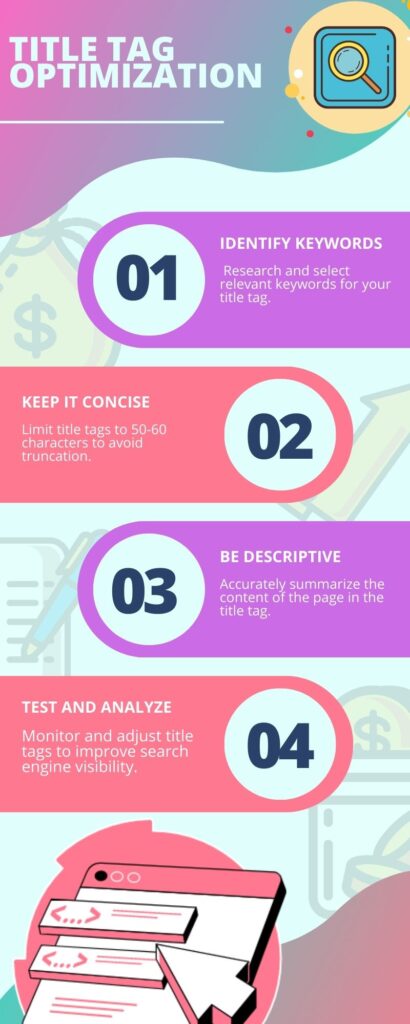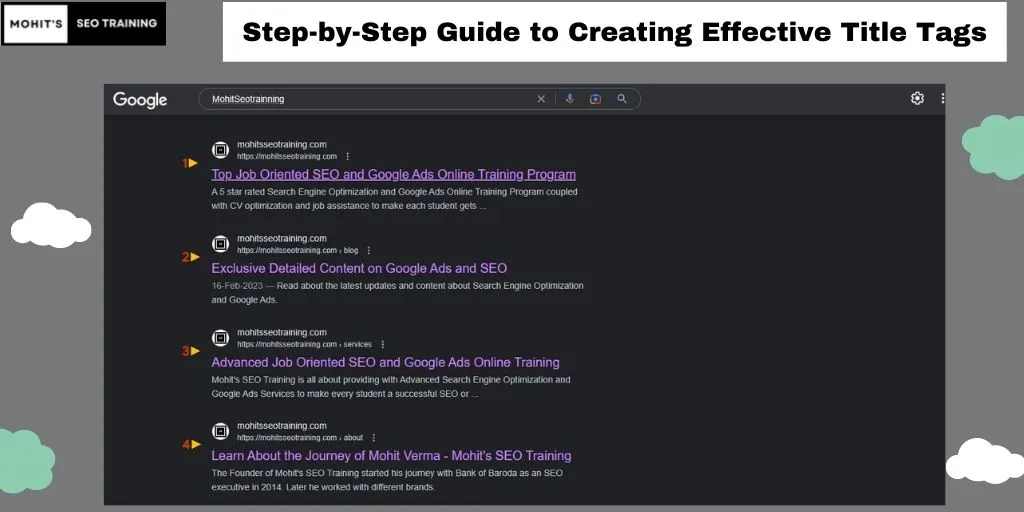There are a number of crucial fundamentals you must comprehend before launching an online presence for your company. One of these essentials is SEO (Search Engine Optimization), which is a collection of online tactics you use to increase the visibility and accessibility of your website to as many people as you can via a search engine like Google.
The success of your website will be determined by how well each of these sorts performs. Which on-page component, then, is more important for SEO?
The title tag is one of the most crucial on-page SEO (search engine optimization) variables for ranking a website. The clickable headline for a particular webpage may be found on search engine results pages, or SERPs, thanks to the title tag, an HTML element that identifies the title of a webpage. When someone uses a search engine to get information, it is one of the initial things they see. It is also one of the most important aspects that search engines use when evaluating the value and relevancy of a website.
Title Tags’ Vital Role in SEO
- First image: When a user searches, the title tag is the primary thing they see, and it may give them a positive or negative image of a website. Potential customers can be drawn in and persuaded to visit the website by a carefully worded title tag, but they can also be turned off by one.
- The factor for ranking: Title tags are used by search engines as a ranking element in their algorithms. A webpage may rank better in search engine results pages with the use of a pertinent, detailed, and keyword-rich title tag. This increases website visibility and traffic.
- Credibility and Trust: A well-written title tag that properly summarizes a webpage’s content can aid in determining a website’s credibility and trustworthiness. Visitors may feel more sure that they have discovered what they are seeking for and may be enticed to investigate the web page further if the title tag appropriately describes the material of the webpage.
- Branding: A website’s title tag may also serve as an advertising technique. A brand’s identification and engagement with potential customers can be increased by placing its name in the title tag.
- Online Explorers: Since a title tag is the one that shows up at the top of the web browser, it serves as the placeholder. This makes it easier for the audience you are targeting to interpret the information on your website, especially for users who frequently have many browser tabs open. To prevent your target audience from losing track of your website and content, make sure your title tag is distinctive and recognizable and starts with the appropriate keywords.
Guide to Creating Effective Title Tags

The Best SEO Practices for Title Tags
- Keep it brief: Title tags ought to be succinct and direct. A title tag should be between 50 and 60 characters long. Anything lengthier might be clipped in results pages for search engines, which would lessen its usefulness.
- Use keywords: The title tag should contain keywords, but they should be used in a way that is natural and pertinent. Keep your title tag free of keyword stuffing to avoid search engine penalties.
- Accurate and Educational: The title tag ought to accurately reflect the information on the homepage and be educational enough to persuade people to go through to the website. A website’s credibility may be harmed if clickbait or deceptive headlines are used. If your website offers online training in SEO, make sure your title tags accurately reflect this, such as ‘Effective SEO Online Training: Tips and Strategies
- Unique: Each page on a website should have a title tag that is distinct and appropriately describes the content of the page. Confusion for visitors is reduced and search engines are helped by this in understanding the material of the webpage.
In summary, the title tag is a critical element of SEO and has a significant impact on a website’s visibility and ranking in the results pages of search engines. Websites may improve their entire online appearance, draw in more visitors, build trust and credibility, and create effective title tags by adhering to best practices.
